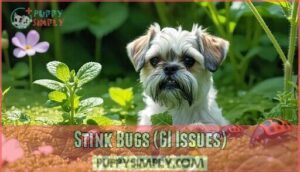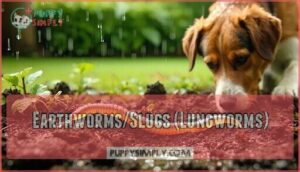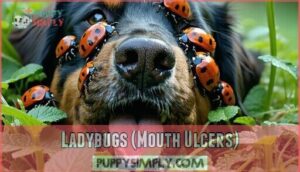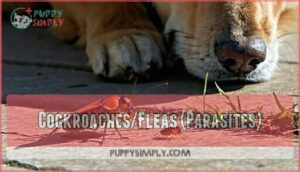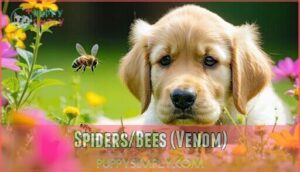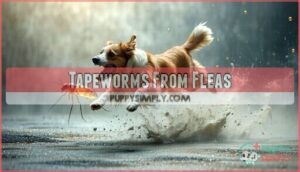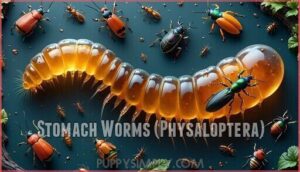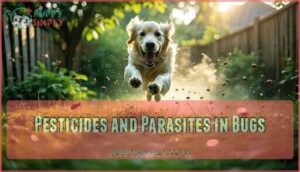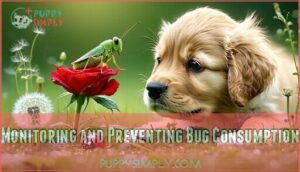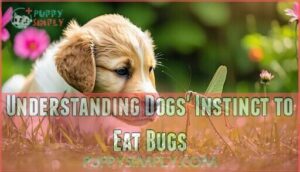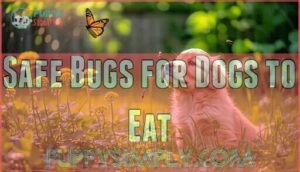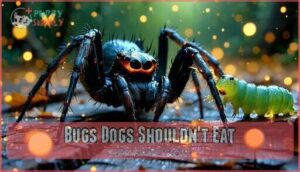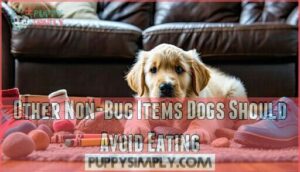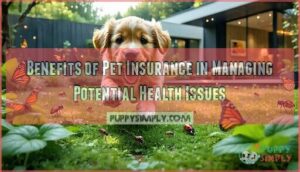This site is supported by our readers. We may earn a commission, at no cost to you, if you purchase through links.
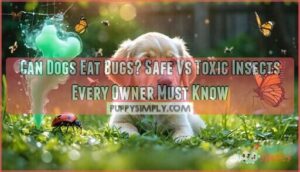 Most dogs can eat bugs insects safely, but you’ll want to keep an eye on what they’re chomping. Harmless flies, moths, and certain beetles won’t hurt your pup and actually provide protein.
Most dogs can eat bugs insects safely, but you’ll want to keep an eye on what they’re chomping. Harmless flies, moths, and certain beetles won’t hurt your pup and actually provide protein.
However, steer clear of the troublemakers: stink bugs cause stomach upset, earthworms carry lungworms, and spiders pack venom. Cockroaches and fleas bring unwanted parasites to the party.
Your dog’s inner hunter will always chase creepy crawlers – it’s hardwired instinct. While you can’t stop every bug-catching adventure, knowing which insects spell trouble helps you protect your four-legged explorer.
Some bugs hide dangers you’d never expect, and being aware of these dangers is crucial for your dog’s safety.
Table Of Contents
- Key Takeaways
- Bugs That Dogs Should Avoid
- Potential Dangers of Eating Bugs
- Monitoring and Preventing Bug Consumption
- Understanding Dogs’ Instinct to Eat Bugs
- Safe Bugs for Dogs to Eat
- Bugs Dogs Shouldn’t Eat
- Can Dogs Eat Grass?
- Other Non-Bug Items Dogs Should Avoid Eating
- Benefits of Pet Insurance in Managing Potential Health Issues
- Frequently Asked Questions (FAQs)
- What bugs are safe for dogs to eat?
- Is it bad for dogs to eat bugs?
- How can I tell if my dog has eaten a dangerous bug?
- What are the symptoms of an allergic reaction to bug consumption?
- Does eating bugs provide health benefits for my dog?
- Is there a way to prevent my dog from eating bugs?
- Why do puppies eat more bugs than adult dogs?
- Can dogs develop allergies to certain insects?
- Should I stop my dog from eating flies?
- Do indoor dogs still have bug-eating instincts?
- Conclusion
Key Takeaways
- You can let your dog eat harmless bugs like flies, moths, and certain beetles – these provide protein and won’t hurt your pup, but avoid the dangerous ones like stink bugs, spiders, and anything that’s been around feces.
- Watch for immediate symptoms if your dog eats questionable insects – vomiting, drooling, mouth swelling, or breathing difficulties mean you need to contact your vet right away, especially with venomous spiders or toxic bugs.
- Your dog’s bug-hunting behavior is completely normal instinct – they’re hardwired to chase and eat small moving creatures for protein and exploration, so you can’t stop it entirely but you can redirect their attention when needed.
- Prevent serious health issues by keeping your yard clean and using flea prevention – eliminate standing water, remove rotting organic matter where dangerous bugs congregate, and maintain regular parasite prevention to protect against lungworms and tapeworms.
Bugs That Dogs Should Avoid
While most bugs won’t harm your dog, some insects can cause serious health problems ranging from mouth ulcers to dangerous parasitic infections.
You’ll want to know which creepy crawlers to keep away from your curious pup, because not all backyard snacks are created equal.
Stink Bugs (GI Issues)
When your dog encounters stink bugs, these shield-shaped insects pack a nasty punch that’ll turn your pup’s stomach upside down.
Stink bugs turn curious pups into queasy patients faster than you can say "fetch."
Stink bug toxins cause serious gastrointestinal upsets, triggering vomiting and drooling that’ll have you rushing to clean up messes.
These toxic insects dogs should avoid create GI distress signs within hours.
Prevention strategies include keeping your dog away from garden areas where these bugs congregate, because treatment options mainly involve supportive care to address the gastrointestinal upsets.
Earthworms/Slugs (Lungworms)
While stink bugs cause stomach upset, earthworms and slugs pose a more serious threat—lungworm.
These slimy creatures carry parasitic infections that target your dog’s respiratory system.
Lungworm symptoms include persistent coughing and breathing difficulties.
Environmental risks increase when dogs eat bugs like earthworms during outdoor exploration.
Diagnosis challenges make early detection tricky, so focus on snail prevention by keeping your yard clean and considering deworming options with your vet.
Lungworm, primarily caused by tracheal worm Oslerus osleri, can be treated with antiparasitic drugs.
Ladybugs (Mouth Ulcers)
Those colorful little beetles aren’t as harmless as they seem.
Asian ladybugs release toxic chemicals when threatened, causing painful mouth ulcers and digestive irritation.
Here’s what you’ll notice if your dog munches these spotted troublemakers:
- Mouth Irritation – Drooling and pawing at face
- Ulcer Symptoms – Red, swollen gums or tongue
- Ladybug Lookalikes – Orange beetles are most dangerous
- Treatment Options – Rinse mouth, contact vet immediately
Cockroaches/Fleas (Parasites)
Unlike ladybugs that cause mouth ulcers, cockroaches and fleas present serious parasite risks.
These nasty critters carry stomach worms and flea tapeworms that’ll make your dog miserable. Roach diseases include bacterial infections, while insecticide exposure adds another layer of danger.
Fleas can transmit parasites, so regular deworming is essential for dogs at risk.
| Bug Type | Primary Risk | Health Impact | Prevention | Vet Action |
|---|---|---|---|---|
| Cockroaches | Stomach worms | Chronic vomiting | Eliminate food sources | Immediate checkup |
| Fleas | Tapeworms | Anal irritation | Monthly preventatives | Fecal examination |
| Both | Bacterial infection | GI distress | Environmental cleanup | Deworming treatment |
| Pesticide bugs | Insect poisoning | Tremors/seizures | Avoid treated areas | Emergency care |
| Mixed exposure | Multiple parasites | Weight loss | Regular vet checkups | Thorough testing |
Parasite prevention beats treatment every time.
Spiders/Bees (Venom)
Venomous spiders and bees pack a dangerous punch that can seriously harm your dog.
Spider venom from black widows or brown recluses causes severe toxicity, while bee stings trigger painful swelling and potentially life-threatening allergic reactions.
These insects aren’t worth the risk.
- Black widow spiders: Their venom attacks your dog’s nervous system, causing tremors and paralysis
- Bee stings in the mouth: Can block airways and require immediate first aid treatment
- Brown recluse bites: Create tissue-destroying wounds that spread and worsen over time
Potential Dangers of Eating Bugs
While many bugs won’t hurt your dog, some can cause serious health problems that’ll have you rushing to the vet faster than your pup chases a tennis ball.
From tapeworms hiding in fleas to dangerous pesticides coating garden insects, understanding these risks helps you protect your furry friend from turning snack time into sick time.
Tapeworms From Fleas
When dogs eat bugs, they’re playing a dangerous game of microscopic roulette.
Fleas carry tapeworms that hitch a ride into your dog’s digestive system. These sneaky parasites steal nutrients and can cause serious health issues.
| Flea Lifecycle Stage | Tapeworm Risk |
|---|---|
| Egg | No direct risk |
| Larva | Ingests tapeworm eggs |
| Pupa | Develops infection |
| Adult | Carries mature tapeworms |
| Infected flea eaten | Transmits parasites to dog |
Preventative medication and regular deworming treatment protect against these parasitic infections. Remember, zoonotic risk means humans can catch tapeworms too.
Stomach Worms (Physaloptera)
These stomach-dwelling parasites follow a sneaky Physaloptera lifecycle that’ll make your head spin. When dogs eat bugs like crickets or beetles, they’re rolling the dice with parasitic infections.
Physaloptera worms attach to your dog’s stomach lining, causing chronic vomiting that’s no joke. To prevent issues, consider a regular deworming schedule.
Watch for these infection symptoms:
- Persistent vomiting (sometimes with visible worms)
- Weight loss and lethargy
- Dark, bloody stools
- Loss of appetite
Diagnosis methods include endoscopy since regular fecal tests often miss these crafty parasites.
Treatment options typically involve pyrantel pamoate or fenbendazole medications. Prevention strategies focus on limiting your dog’s access to infected insects and maintaining regular deworming schedules.
Pesticides and Parasites in Bugs
While your dog might think that beetle looks like a tasty snack, there’s more lurking beneath the surface than meets the eye.
Beyond the obvious dangers of toxic bugs, pesticide exposure and parasite transmission create hidden health risks. Many insects carry insecticides from treated lawns or fertilizer contamination from agricultural areas. These chemicals can poison your pup even if the bug itself isn’t harmful.
| Risk Type | Common Sources |
|---|---|
| Pesticide Exposure | Lawn-treated insects, garden bugs |
| Parasite Transmission | Fleas, cockroaches, earthworms |
| Insecticide Risks | Agricultural area insects |
| Bug-Borne Illnesses | Ticks, mosquitoes, kissing bugs |
The parasitic risks are equally concerning. Insect-borne parasites can cause serious infections, making prevention your best defense against these microscopic hitchhikers.
Monitoring and Preventing Bug Consumption
While you can’t stop your dog from being curious about every creepy-crawly in the yard, you can take smart steps to keep them safe from harmful insects.
The key is staying alert during outdoor time and knowing when to call your vet if something goes wrong, which is a critical action to ensure your dog’s safety.
Monitoring Dog’s Outdoor Activities
Your backyard might seem like a safe playground, but it’s actually a buffet of potentially dangerous insects waiting for your curious pup to discover. Smart pet monitoring during outdoor exploration can prevent serious health issues before they start.
Here are essential preventative measures for safer outdoor adventures:
- Yard Inspection – Check your space for toxic bug hotspots like stagnant water or rotting wood
- Leash Training – Keep dogs close during walks to control what they investigate
- Supervise Playtime – Watch for excessive bug hunting behavior and redirect when needed
- Bug Spray – Use pet-safe insect repellent in areas with high concentrations of harmful insects
- Insect Avoidance Training – Teach "leave it" commands to discourage unwanted snacking
Understanding dog behavior helps you recognize when outdoor exploration becomes risky bug consumption. Consider using a camera for pet safety to remotely monitor your dog’s outdoor activities.
Immediate Vet Contact if Dog Gets Sick
Time can be your dog’s best friend when dealing with potential insect poisoning dogs scenarios.
If your dog ate insect and shows severe symptoms like vomiting, diarrhea, or breathing difficulty, contact your veterinarian immediately.
Don’t wait to see if symptoms worsen.
Toxin exposure from venomous spiders or toxic bugs requires swift action.
Watch for behavioral changes such as excessive drooling, lethargy, or mouth swelling.
Allergic reactions can escalate quickly, making prompt veterinary intervention vital for treating insect poisoning dogs effectively.
Pet emergencies involving bug consumption aren’t always obvious, so trust your instincts.
During holidays, it’s also wise to research local emergency vets in advance.
When in doubt, call your veterinarian—they’d rather hear from a concerned owner than treat a preventable emergency later.
Using Flea Prevention
When your vet confirms your dog’s health after eating bugs, implementing regular flea prevention becomes your next line of defense.
Fleas aren’t just pesky hitchhikers – they’re dangerous disease carriers that can transmit tapeworms and cause flea allergy dermatitis in sensitive dogs.
Here’s why consistent flea medication matters for pet safety:
- Break the flea life cycle: Preventative flea measures stop eggs from developing into biting adults
- Reduce parasite transmission: Safe flea products protect against multiple parasites, not just fleas
- Prevent secondary infections: Ticks and other insects often accompany flea infestations
Modern flea medication types include topical treatments, oral medications, and flea collars.
Many owners find success with various flea solutions.
Don’t wait for an infestation to start – year-round pet parasite prevention works better than playing catch-up.
Some insecticides in over-the-counter products can be harsh, so consult your vet about the safest options for your dog’s size and health status.
Understanding Dogs’ Instinct to Eat Bugs
Your dog’s fascination with chasing and munching on bugs isn’t just random behavior—it’s hardwired into their DNA from thousands of years of hunting instincts.
When your pup spots that buzzing fly, their ancient wolf DNA kicks into overdrive—it’s pure predator instinct.
When your pup spots a buzzing fly or crawling beetle, they’re responding to the same primal drive that helped their ancestors survive, plus bugs offer a quick protein snack that satisfies their natural curiosity about the world around them.
This behavior is a result of their ancestors’ need to survive, and it showcases their natural curiosity.
Primal Hunting Instinct
Picture your dog spotting a buzzing fly across the yard – that sudden head tilt and laser focus isn’t just cute, it’s their prey drive kicking in.
This instinctive behavior traces back thousands of years when wild canines relied on hunting smaller creatures for survival.
Your dog’s curiosity factor plays a huge role in their insect-eating habits. They’re naturally wired to investigate anything that moves, crawls, or flies.
It’s not just about hunger – it’s about sensory stimulation and exploration. Dogs use mouth exploration the same way we use our hands.
When they encounter a cricket or beetle, they’re gathering information through taste, texture, and smell. This canine behavior is completely normal and shouldn’t alarm you.
Their prey drive doesn’t distinguish between a rabbit and a grasshopper – movement triggers the same hunting response. While this instinctive behavior served their ancestors well, today’s pet dogs maintain these ancient impulses even when their food bowl is full.
Bugs as a Source of Protein
Your dog’s fascination with bugs isn’t just curiosity—it’s nutritional instinct at work.
Insect protein offers high-quality nutrients that complement traditional dog nutrition.
Many insects safe for dogs contain essential amino acids, healthy fats, and minerals like calcium and iron.
This sustainable food source has been part of canine alternative diets for millennia.
However, bugs nutrition dogs receive varies widely by species.
While some provide excellent protein quality, digestion concerns arise with certain varieties.
Think of it as nature’s supplement—beneficial when chosen wisely, but requiring careful selection for ideal insect diet dogs can safely enjoy, as part of a sustainable food source.
Safe Bugs for Dogs to Eat
While your dog’s bug-hunting adventures might seem alarming, some insects actually make harmless snacks that won’t hurt your furry friend.
You’ll be relieved to know that common household pests like flies, moths, and certain ants pose no real threat when your curious pup decides to sample nature’s buffet, and these encounters can be considered harmless.
Harmless Flies and Moths
Most common household insects like flies and moths won’t hurt your dog if they sneak a snack.
These harmless bugs actually offer decent fly nutrition and pose minimal risk when consumed occasionally.
Here’s what makes these insects relatively safe:
- Moths lack toxins – Most moth types digest easily without causing adverse reactions
- Flies contain protein – House flies provide nutrients without dangerous compounds
- Small consumption amounts – A few bugs won’t trigger serious health issues
- Rare allergic reactions – Most dogs tolerate these insects without problems
- No parasite transmission – Unlike other bugs, flies and moths rarely carry harmful parasites
Your dog eating bugs like these occasionally isn’t cause for panic.
Non-poisonous Ants (Avoid Fire Ants)
Most ants offer excellent ant nutritional value, packing protein and vitamin C into tiny packages.
Your dog eating bugs like common black garden ants is perfectly normal—ant digestion happens smoothly without issues.
However, ant species ID matters vitally here.
Fire ants deliver painful stings that cause swelling and allergic reactions.
Puppy ant eating typically increases due to curiosity, but ant overconsumption rarely occurs since these safe insects for dogs taste bland.
Monitor for concerning dog health insects symptoms.
Safe Beetles (in Moderation)
Most beetles won’t harm your dog, but quantity matters in the case of these crunchy insects.
June beetles and similar safe bugs provide decent beetle nutrition with protein and minerals. However, their tough exoskeletons can upset your pup’s gut health if eaten in large amounts.
Different beetle types carry varying risks. Garden beetles are generally safer than those found near garbage or contaminated areas.
No special preparation methods are needed since dogs naturally process these insects, but moderation prevents digestive drama.
Watch for signs like vomiting or diarrhea after your dog munches on beetles. A few here and there? No problem. A beetle buffet? That’s asking for trouble.
Your dog’s stomach will thank you for keeping beetle snacking reasonable.
Nontoxic Locusts (Limit Due to Exoskeleton)
Locusts pack impressive nutrition for dogs but come with a catch – their tough exoskeleton. These insects dogs can safely consume offer protein benefits, though canines eat insects like locusts best in controlled portions.
Consider these preparation methods for safe insect ingestion dogs:
- Remove wings and legs to ease exoskeleton digestion
- Limit safe amounts to 2-3 locusts per feeding
- Watch for allergy concerns like vomiting or itching
- Source from pesticide-free areas only
Bugs Dogs Shouldn’t Eat
While many bugs won’t harm your dog, some insects can turn snack time into a trip to the vet’s office.
You’ll want to steer your pup away from venomous spiders, toxic fireflies, and anything that’s been crawling around in less-than-appetizing places, to avoid a potentially toxic situation.
Avoid Bugs That Eat Feces (Crickets, Cockroaches, Grubs, Caterpillars)
You’ll want to steer clear of feces-eating bugs like cockroaches, crickets, grubs, and caterpillars – they’re basically walking disease vectors.
These insects pick up parasites from their disgusting dining habits, creating serious fecal bug risks for your pup.
A study found parasites in 35% of insect farms, with stomach worms being particularly common.
These bugs can transmit Salmonella and E. coli, wreaking havoc on your dog’s gut health.
Prevention tips include keeping food bowls clean and limiting outdoor access to contaminated areas.
Avoid Venomous Bugs (Black Widows, Brown Recluses, All Spiders)
While bugs that scavenge waste create one concern, venomous spiders present an entirely different level of danger.
Spider identification becomes critical when you spot the distinctive red hourglass of black widows or the violin-shaped marking on brown recluse spiders.
These venomous spiders pack enough venom toxicity to seriously harm dogs, causing muscle spasms, tissue death, and potentially fatal reactions.
Bite symptoms include drooling, tremors, and severe pain.
First aid means rushing to your vet immediately.
Prevention training should teach your dog "leave it" commands around insects.
Don’t take chances with any spiders—even "harmless" ones can deliver nasty bites that’ll ruin everyone’s day.
Avoid Overeating Ladybugs, Stink Bugs, Cicadas (Upset Stomach)
While ladybugs, stink bugs, and cicadas aren’t deadly, too many can turn your dog’s stomach into a churning mess.
Ladybug toxicity causes mouth burns, while stinkbug effects include drooling and nausea.
Cicada overload overwhelms their digestive system with tough exoskeletons, and these bugs bad for dogs create GI discomfort when consumed in large quantities, so moderation matters.
Slugs as Carriers of Lungworms
Behind every slimy garden slug lurks a dangerous secret—lungworm larvae that can seriously harm your dog.
These gastropods thrive in moist environments where they pick up parasites from contaminated soil.
When dogs eat slugs, they’re ingesting potential lungworm infections that cause coughing, breathing difficulties, and lethargy.
Infection symptoms often develop weeks later, making the connection tricky.
Environmental control through yard maintenance helps, but preventative medication from your vet offers the best protection against these sneaky parasites hiding in insects and slugs.
Can Dogs Eat Grass?
Many dogs treat grass like nature’s salad bar, and this common behavior isn’t necessarily harmful.
While your pup munches on lawn greens, they’re often seeking digestive enzymes or displaying normal pica behavior.
Here’s what you should know about canine grass consumption:
- Grass varieties matter – avoid chemically treated lawns
- Vomiting indicator – occasional grass-induced vomiting is normal
- Grass nutrition provides fiber and folic acid
- Pesticide exposure poses the main risk
- Moderation prevents stomach upset
Unlike dangerous insects, grass eating rarely requires veterinary intervention.
Some dogs may eat grass to fulfill instinctual evolutionary behaviors.
Other Non-Bug Items Dogs Should Avoid Eating
While you’re keeping your dog safe from dangerous bugs, don’t forget they’ll also try to eat plenty of other questionable items around your home.
Your curious pup might snack on crayons, socks, rocks, shoes, or even other animals’ poop, which can cause serious digestive problems or require emergency surgery.
Crayons
While we’ve covered outdoor hazards like grass consumption, indoor art supplies pose their own risks.
Your dog’s artistic curiosity can lead to trouble when crayons become chew toys.
Crayon toxicity occurs when pets ingest wax-based coloring tools, though most incidents result in mild stomach upset rather than serious poisoning.
Crayon ingredients like paraffin wax and pigments aren’t highly toxic, but they’re not digestible either.
Large pieces can cause intestinal blockages, while excessive consumption may trigger vomiting or diarrhea.
Pet poisoning from crayons typically resolves quickly, but you’ll want to monitor your pup closely.
For concerned owners, there are options such as nontoxic art supplies.
Consider crayon alternatives like washable markers for crayon art projects, keeping traditional wax versions out of reach.
If your dog becomes a repeat offender with art supplies, designated play areas work better than hoping they’ll ignore tempting objects.
Unlike toxic insects or bugs that pose immediate danger, crayons fall into the "annoying but manageable" category of household hazards.
Poop
Beyond crayons, dogs often discover another "delicacy" that’s equally problematic: poop. This coprophagia behavior puts your furry friend at serious risk for parasites and infections.
Feces from other animals contain dangerous bacteria that can wreak havoc on your dog’s digestive system.
Here’s what to watch for:
- Poop Color changes indicating digestive upset
- Poop Consistency becoming loose or watery after consumption
- Poop Frequency increasing dramatically
- Parasite Check symptoms like lethargy or appetite loss
- Dietary Impact showing nutritional deficiencies from poor choices
Socks, Rocks, and Shoes
Your dog’s fascination with socks, rocks, and shoes isn’t just quirky pet behavior—it’s dangerous pica behavior that demands immediate attention.
These non-food items create serious swallowing dangers and digestive obstruction risks.
Material attraction to fabric textures or interesting shapes can lead to emergency surgery.
Implementing consistent training solutions and keeping tempting objects out of reach protects your pup from life-threatening blockages.
Antacids
Alongside dangerous insects and household items, antacids pose another hidden threat to your furry friend.
These seemingly harmless medications can wreak havoc on your dog’s system if consumed.
Here’s what makes antacids dangerous for dogs:
- Antacid Types like calcium carbonate can cause kidney stones
- Dosage Guidelines meant for humans are toxic to smaller bodies
- Side Effects include vomiting, diarrhea, and electrolyte imbalances
- Natural Alternatives like bland rice work better for upset stomachs
- When to Use – never without vet approval first
Benefits of Pet Insurance in Managing Potential Health Issues
Why risk financial stress when your dog decides beetles are gourmet treats?
Pet insurance transforms scary vet bills into manageable expenses when insects cause health problems.
You’ll gain peace of mind knowing treatment costs won’t break the bank if your pup needs veterinarian care for toxic bug consumption.
| Coverage Options | Policy Costs |
|---|---|
| Emergency visits for poisoning | $15-$70 monthly |
| Parasite treatment from insects | Varies by breed/age |
| Diagnostic tests for symptoms | Deductibles $100-$1000 |
| Prescription medications | 70-90% reimbursement |
Smart choosing plans protects your wallet and your dog’s health.
The claim process guarantees you focus on pet health, not expenses, allowing for better care and financial security.
Frequently Asked Questions (FAQs)
What bugs are safe for dogs to eat?
Most dogs accidentally munch on bugs daily.
Safe options include flies, moths, grasshoppers, crickets, and June bugs in moderation. These provide protein without harm.
Avoid toxic varieties like fireflies, beetles, and stink bugs completely, as they can be harmful.
Is it bad for dogs to eat bugs?
It’s generally not bad when your pup munches on harmless bugs like flies or grasshoppers.
However, toxic insects like fireflies or beetles can cause serious health issues, so monitor what they’re snacking on.
How can I tell if my dog has eaten a dangerous bug?
Watch for vomiting, diarrhea, drooling, or mouth swelling within hours of bug consumption.
If your dog shows lethargy, loss of appetite, or difficulty breathing, contact your vet immediately—these symptoms signal trouble.
What are the symptoms of an allergic reaction to bug consumption?
Could your furry friend be having an allergic reaction?
Watch for excessive drooling, facial swelling, difficulty breathing, hives, vomiting, or pale gums.
These symptoms require immediate veterinary attention for your dog’s safety.
Does eating bugs provide health benefits for my dog?
Yes, safe bugs can offer your dog some nutritional benefits like protein, fat, and vitamin C. However, these benefits aren’t significant enough to replace proper dog food or treats.
Is there a way to prevent my dog from eating bugs?
Your dog’s suddenly become a bug connoisseur, hasn’t it?
Training with "leave it" commands works best. Redirect their attention to toys or treats when they spot insects.
Remove standing water and keep your yard clean to reduce bug populations.
Why do puppies eat more bugs than adult dogs?
Puppies eat more bugs than adult dogs because they’re naturally more curious and use their mouths to explore everything.
Their heightened curiosity drives them to investigate crawling insects, making bug-eating more common, which can be seen as a naturally occurring behavior in young dogs.
Can dogs develop allergies to certain insects?
Just like humans, your furry friend can develop allergies to specific insects through repeated exposure.
Bee stings, ant bites, or eating certain bugs might trigger reactions like swelling, hives, or breathing difficulties requiring immediate veterinary attention.
Should I stop my dog from eating flies?
Flies aren’t the hill you’ll die on – they’re generally harmless snacks for your pup.
You don’t need to stop this behavior since houseflies pose minimal risk and satisfy your dog’s natural hunting instincts perfectly fine.
Do indoor dogs still have bug-eating instincts?
Yes, your indoor dog still has those natural hunting instincts.
They’ll chase and eat bugs they find inside, driven by curiosity and prey drive.
It’s completely normal behavior that doesn’t disappear just because they’re indoors.
Conclusion
Exploring the bug buffet doesn’t have to feel like walking through a minefield.
While you can’t transform your pup into a picky eater overnight, you’ve now got the knowledge to spot trouble before it starts.
Remember, most bugs won’t harm your dog, but staying alert to the dangerous ones keeps your furry friend safe.
When wondering "can dogs eat bugs insects," trust your instincts and consult your vet if symptoms appear, as your vigilance makes all the difference.
- https://www.dogster.com/dog-nutrition/can-dogs-eat-bugs
- https://cmillerext.com/blog/bugs-your-dogs-should-not-eat/
- https://aspenpestservice.com/2025/04/what-bugs-are-toxic-to-dogs-bugs-that-are-toxic-to-cats/
- https://www.promeal.in/post/nutritional-value-feeder-insects-comparison
- https://www.veterinaryworld.org/Vol.16/August-2023/7.pdf

